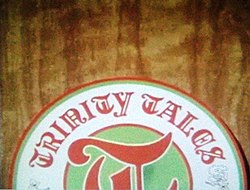Trinity Tales
| Trinity Tales | |
|---|---|

Credit sequence segueing from medieval illustration to pub beer-mat
|
|
| Genre | Comedy drama |
| Written by | Alan Plater |
| Directed by | |
| Starring |
|
| Composer(s) | |
| Country of origin | United Kingdom |
| Original language(s) | English |
| No. of series | 1 |
| No. of episodes | 6 |
| Production | |
| Producer(s) | David Rose |
| Running time | 50 minutes |
| Release | |
| Original network | |
| Original release | 21 November – 26 December 1975 |
| External links | |
| Website | www |
Trinity Tales was a 1975 British television series, consisting of six 50-minute programmes, written by Alan Plater and shown on BBC2. It was loosely based on Geoffrey Chaucer's Canterbury Tales, updated to a modern setting.
The series evolved from a stage play by Plater, "Trinity Tales or The Road to Wembley", which was performed by the Birmingham Repertory Theatre Company from 30 January 1975 to 22 February 1975.
A bus carrying supporters of rugby league club Wakefield Trinity is on its way from Wakefield to a Challenge Cup Final at London's Wembley Stadium. To pass the time each of the characters on the bus tells a story. The teller of the best tale will win a free fish-and-chip supper provided by "Stan the Fryer", a chip shop proprietor. Along with Stan, the travellers are Nick, the bus driver, "Smith, the Man of Law" (a policeman), "Alice, the wife of Batley", "Dave the Joiner", his girlfriend "Judy the Judy" and a writer referred to as "Eric the prologue". On the way they stop off at several pubs. At one stop-off point they pick up the pub's lugubrious landlord, Reuben.
Names such as "Stan the Fryer" and the "Wife of Batley" are parodies of the names of the Chaucerian characters, the Wife of Bath and the Huberd the Friar. The figure of Chaucer himself is replaced by the writer Eric.
Plater adapted five of the original stories: the Miller's Tale, the Wife of Bath's tale, the Reeve's Tale, the Knight's Tale and the Franklin's Tale. Another story begun by Eric is cut off by the other pilgrims for being boring, just like Chaucer's tale of Sir Thopas in the original.
...
Wikipedia
